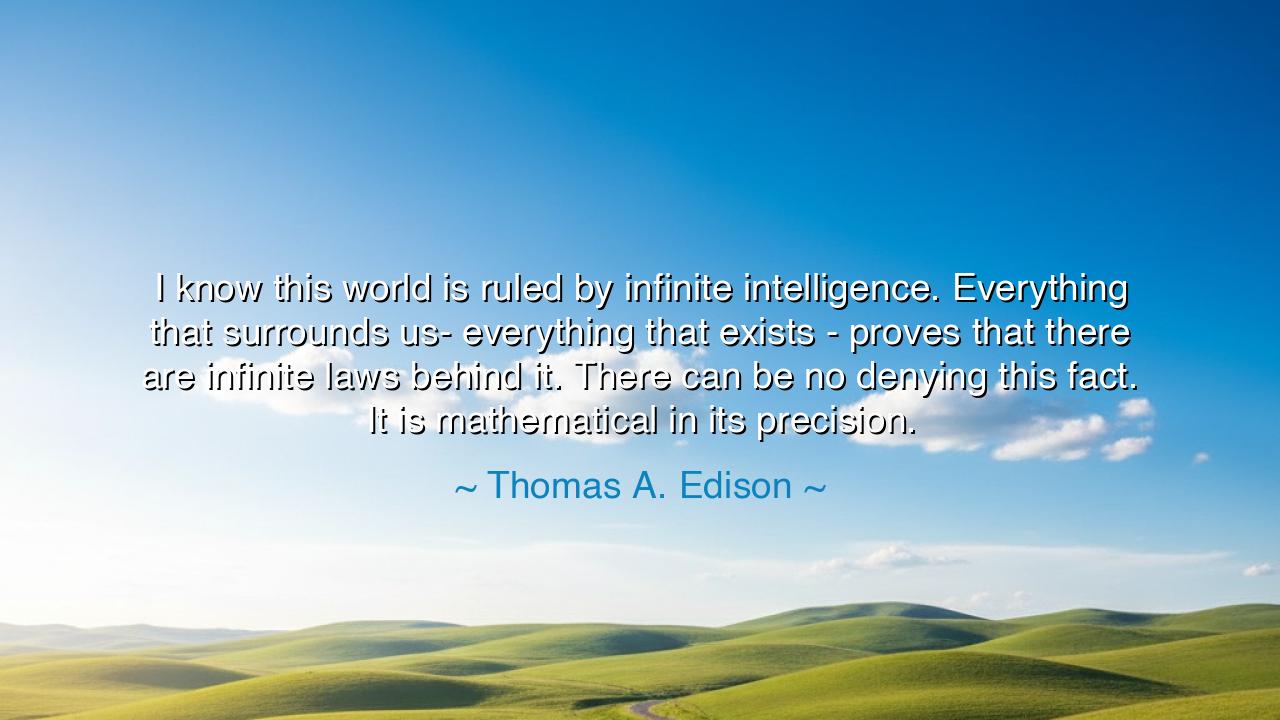
I know this world is ruled by infinite intelligence. Everything
I know this world is ruled by infinite intelligence. Everything that surrounds us- everything that exists - proves that there are infinite laws behind it. There can be no denying this fact. It is mathematical in its precision.






“I know this world is ruled by infinite intelligence. Everything that surrounds us — everything that exists — proves that there are infinite laws behind it. There can be no denying this fact. It is mathematical in its precision.” – Thomas A. Edison
In this exalted reflection, Thomas A. Edison, the great inventor and seeker of truth, peers into the very heart of existence and beholds not chaos, but order — a divine intelligence that governs all things. His words are not the idle musings of a dreamer, but the revelation of a man who spent his life unraveling the secrets of nature. Having toiled through countless experiments, failures, and triumphs, Edison had come to see the world as an architecture of reason and precision, woven by an infinite intelligence whose laws bind the stars and the atoms alike. He speaks not only as a scientist but as a mystic of the modern age — one who saw, beneath the whir of machines and the glow of electricity, the unmistakable rhythm of the divine mind.
The origin of this quote lies in Edison’s lifelong fascination with the harmony of nature and invention. Though known to history as the master of practical genius, Edison was, at his core, a philosopher of the unseen. For him, invention was not the act of creating something from nothing, but of discovering what already existed in the mind of the universe. Every experiment, every circuit, was a prayer to the laws that governed the cosmos. He believed that these laws were not random but mathematical in their precision — proof that behind the visible world there dwelled an intelligence far greater than human understanding. To Edison, this “infinite intelligence” was both God and Law, mystery and logic entwined.
In his view, every phenomenon — the curve of a leaf, the movement of tides, the flicker of light — bore testimony to this invisible design. He once said that ideas were not his own creations, but “out there in the ether,” waiting to be caught by the receptive mind. Such was his faith in the order of the universe: that if one searched with patience, one would find that the mind of man and the mind of nature were reflections of the same intelligence. Thus, his life became a dialogue with creation — an ongoing conversation with the divine, expressed through invention and discovery.
The ancients, too, understood this truth long before Edison spoke it. The philosopher Pythagoras taught that number and harmony form the foundation of all existence — that the universe itself is a cosmic symphony, governed by mathematical law. To him, as to Edison, the precision of nature was evidence of mind — not a human mind, but a universal one. Likewise, Isaac Newton, who revealed the laws of motion and gravity, wrote not as a man denying God, but as one marveling at His order. He said, “The most beautiful system of the sun, planets, and comets could only proceed from the counsel and dominion of an intelligent and powerful Being.” In this lineage of thought, Edison stands as a modern heir — a craftsman of light who saw the divine blueprint shining behind all invention.
Edison’s conviction that the universe is mathematical in its precision was not cold or mechanical, but reverent. He saw in precision the expression of perfection. Just as a clock testifies to its maker, the intricate harmony of nature testifies to its source. Consider how the sun rises with exact regularity, how snowflakes form in symmetrical beauty, how the heart beats with rhythmic constancy — all point to an intelligence that governs life with unerring law. This law is not cruel nor arbitrary; it is the quiet order through which the universe expresses its love and balance. To recognize this is to move from ignorance to awe, from disbelief to devotion.
And yet, Edison’s insight carries not only wonder but responsibility. If the world is governed by divine intelligence, then we, as fragments of that same intelligence, are called to act with wisdom, purpose, and respect for the laws that sustain us. Just as Edison sought truth through discipline and perseverance, so too must each person seek alignment with the harmony of existence. The “infinite laws” he speaks of are not only physical but moral — laws of cause and effect, of compassion and justice, of creation and destruction. To live wisely, then, is to live in tune with these unseen principles, to act in accordance with the rhythm of truth.
So let this teaching be passed down to those who seek understanding: The universe is not a chaos, but a masterpiece of order. All that exists, from the motion of galaxies to the spark of thought within your mind, is part of a divine pattern — precise, intelligent, and purposeful. Look upon nature not with indifference but with reverence; study her, and you will glimpse the face of God. Strive, as Edison did, to live in partnership with that infinite intelligence, trusting that every law — physical, moral, and spiritual — serves a higher harmony. For when one aligns his life with this truth, he becomes both student and instrument of the divine — a creator among creations, guided by the same luminous mind that rules the stars.






AAdministratorAdministrator
Welcome, honored guests. Please leave a comment, we will respond soon